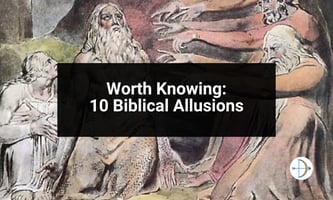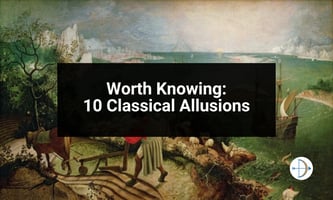All credit to Matthew Pinkett, who has written expansively about the value of allusions in creative...
Worth Knowing: 10 Historical Allusions
Once again, all credit to Matthew Pinkett, who has already written expansively about the value of allusions in creative writing. Hope the following post is useful –
Machiavellian
The Prince, written by Niccolò Machiavelli in the sixteenth century, explores the unscrupulous and ruthless world of Renaissance politics. Useful for characterising devious, manipulative leaders: the Machiavellian scheming of the Head of Science became clear when he claimed sole credit for the excellent GCSE results.
Draconian
Draco was a Greek legislator, famous for imposing and upholding exceptionally strict laws. Useful for indicating the uncompromising, harsh application of a particular rule or policy: The draconian new marking initiative from SLT required teachers to provide at least half a page of written feedback at the end of each lesson for each student.
Hackneyed
The Hackney is a common breed of horse, notable in the past for pulling carts and carriages all over England. Useful for suggesting that an idea lacks originality and also for emphasising plain ol’ banality: The hackneyed plot of the teacher’s new graphic novel was unlikely to get him a deal with a major publishing house.
Pyrrhic Victory
King Pyrrhus of Epirus (northwest Greece) defeated the Romans in two separate battles but, in doing so, his army suffered huge casualties. Useful for drawing attention to a particularly damaging, or ruinous, victory: Gaining an outstanding Ofsted rating proved to be a Pyrrhic victory for the Head when she found out that she’d now be supporting a cluster of nine local schools.
Watergate
The Watergate political scandal resulted in the impeachment and eventual resignation of President Richard Nixon. Useful for emphasising the immorality, or illegality, of a clandestine set of actions: The Watergate moment for the SLT came when a full list of conference expenses was published by the bursar.
Crossing the Rubicon
Julius Caesar and his army crossed the Rubicon River in northwest Italy in 49BC and, in doing so, began a civil war. Useful for referring to an action or event that signals an irrevocable action: The governing body crossed the Rubicon and voted in favour of joining the MAT.
Fiddling Whilst Rome Burns
In 64AD, a large part of Rome was destroyed by a great fire that ravaged the city for nearly a whole week while the emperor Nero occupied himself by playing music. Useful for highlighting ineffectual leadership: With the HMI and her team due the very next morning, the SLT directive to practise the choric chanting of target grades was akin to fiddling whilst Rome burns.
McCarthyism
Joseph McCarthy was the senator in charge of the executing President Truman’s order that American civil service employees should be screened to test for communist leanings. Useful for classifying unfair and unsubstantiated accusations of disloyalty or, more widely, defining a climate of paranoia and distrust: After the scrutiny meeting about the recent Media results, the head of department felt that McCarthyism was no longer a thing of the past.
Custer’s Last Stand
The American cavalry general George Custer and his men were defeated at the Battle of the Little Bighorn in 1876 by a large force of Sioux and Cheyenne fighters. Useful for helping to dramatise a battle and eventual defeat against a more powerful foe: The teacher remarked that he felt like Custer on his last stand trying to keep law and order in the year 8 cover lesson.
Carrying Coals to Newcastle
The North East, famed once for its coal industry, produced a quarter of Britain’s coal in 1913. Useful for highlighting the futility or pointlessness of an action: The hour spent writing the behaviour log would have been better invested carrying coals to Newcastle.


.jpg?width=50&name=douglas-wise%20(2).jpg)



